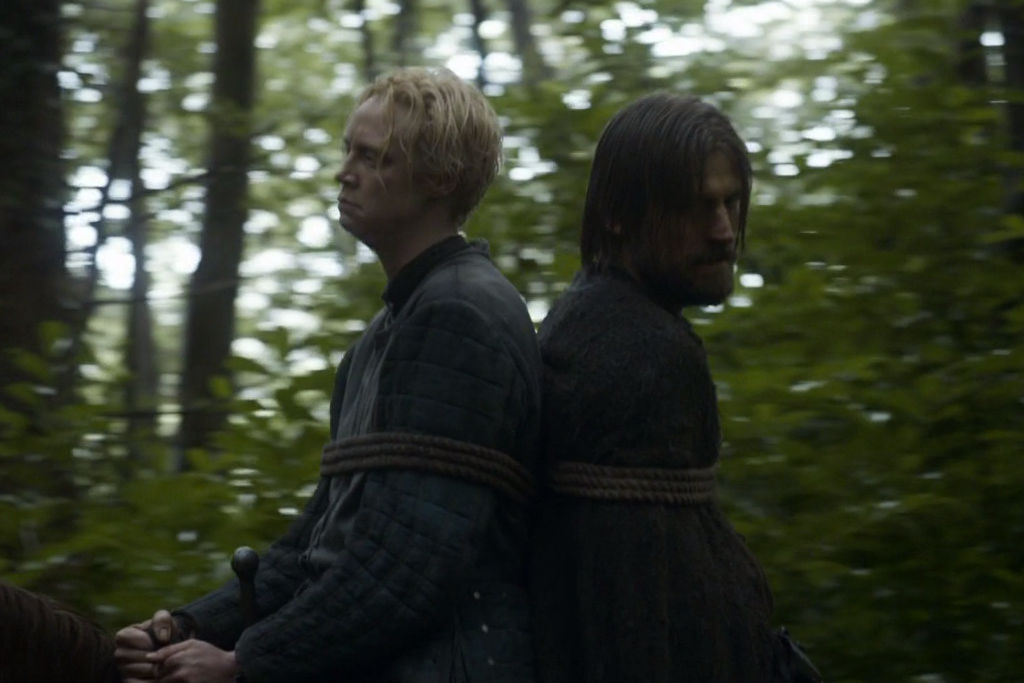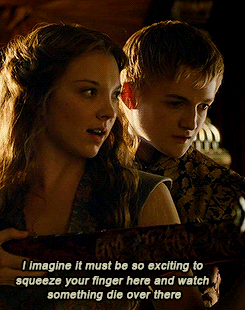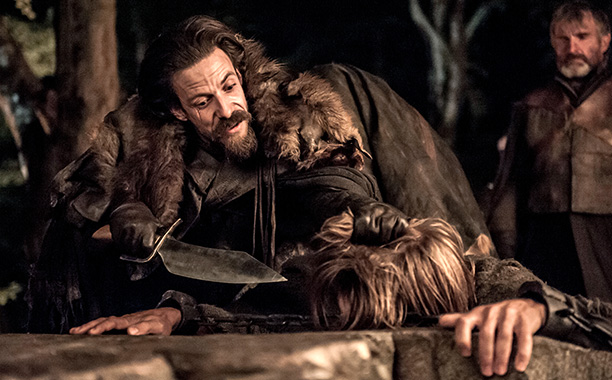Game Of Thrones Week 3: Advanced Stealth Feminism, Or Is Everything Just Terrible?
Winter is coming! Smash the patriarchy! (A Game Of Thrones recap, filled with plenty of spoilers.)

A little while ago, the excellent Lindy West wrote an exasperated, somewhat provocatively-titled post for Jezebel: ‘If I Admit That ‘Hating Men’ Is a Thing, Will You Stop Turning It Into a Self-Fulfilling Prophecy?‘ In it, she detailed exactly why so many of the issues held up by men’s rights activists (MRAs) as things them man-hating feminazis don’t care about are actually already included in the patriarchy-smashing adventure that is contemporary feminism.
Favouring the mother in custody cases? “The assumption that women are naturally better caregivers is part of patriarchy.” Not caring about prison rape, which disproportionately affects men? “Permissiveness and jokes about prison rape are part of rape culture, which is part of patriarchy.” Higher suicide rates for men? “The fact that depression is characterized as an effeminate weakness, making men less likely to seek treatment, is part of patriarchy.” It’s a useful passage that explains some good ways of thinking about gender as socially performative and prescribed, showing how feminism isn’t just about making life fairer for women, but for everyone. It’s also an excellent illustration of exactly why George R. R. Martin is a total stealth feminist – as this week’s episode threw into unusually sharp focus.
When You Play The Game Of Thrones, You Win Or Die. Oh And BTW — Only Super Rich And Strong White Guys Can Win.
Much ink (or pixels or whatever) has been spilled discussing Game of Thrones’ portrayal of rape as both a weapon and byproduct of war, of the female characters’ debatable diversity and agency, and of the treatment of prostitutes. And look, some of it’s not great; we are on premium cable here, and some T&A is inevitable. Many TV shows that are About Power will usually show Powerful Men displaying their power by running their fingers or eyes or money over a pliable hanger-on with sleepy eyes and an aversion to brassieres while discussing something unrelated. Whether the show presents that as something to be emulated, condemned or something in between will tell you a lot about the character (and the show).
But as I’ve pointed out in both previous columns, most of the women of GoT are not presented as powerless: instead, they have their own ways of exerting power, which not only operate within the framework of the patriarchal structure, but take advantage of its tendency to underestimate and belittle women. Compare how effective Cersei’s scheming is to that of the Tyrells’: while Cersei is desperately trying to show off her big dick on the Small Council table alongside all the men, we’ve already seen Margaery use the things many men wave off as things ladies just have — secrets, whispers, a sweet smile, pussy hypnosis — and she is getting everything she wants so far.

“She just gets me, y’know?”
But a world where there is one accepted way of being a man – money, honour, victory, bangin’ ladies – is hard on men as well as women. Men from all backgrounds are conscripted into wars (because honour! and bannermen!) in a Geneva Convention-less world, and even in peacetime are beholden to the patrilineal system that dumps all that money and power on their heads whether they want it or not.
Poor Edmure Tully, for example, is faced with the knowledge that his uncle, Badass Brynden The Ruggedly Handsome Blackfish, might have been better suited to lead their house. When Edmure can’t shoot his father’s pyre with a flaming arrow, or fails his nephking in battle because he’s not a born strategist like Robb apparently is all of a sudden, perhaps he’s thinking of how he would have preferred to wield an axe, supplying Riverrun with good timber. Leaping from tree to tree as they float down the mighty rivers of Westeros! Collecting wildflowers to press in books occasionally! But for the eldest son of House Tully, such ambition would not be accepted.

On the other hand (heh), Jaime is the picture of a Westerosi man: tall, handsome, theoretically rich and virile (his appointment to the Kingsguard means he must swear off women and, as Tyrion’s rightly noted, forgo his claim to the family fortune), and one of the greatest swordsmen in the kingdom. His honour is the only thing in question, what with the whole twincest and king-slaying thing – but he displays real integrity in the way he tries to protect Brienne from something she can’t fight.
In pointing out that her choices are get raped or die, he also nails the catch-22: “If I was a woman, I’d make them kill me. I’m not, thank the gods.” The way he saves her is by pointing out her worth to Locke as chattel; but Jaime’s worth as a human has a little bit of extra room, and Locke is pretty sure nobody on his side is going to wish the Kingslayer still had his sword hand. It’s a punishment for his complacency and cockiness that stands in stark contrast to steely Brienne’s almost-rape; it’s not saying “Well, at least she didn’t get her hand cut off!”, but highlighting what this version of patriarchal society values in men and women.
There’s fascinating subtext to be found in almost every scene – from the brilliant Small Council scene (Look at them all try to assert themselves and get close to Tywin, Dick of Power: Tyrion is “half a man”, Varys and Cersei have no manparts, Pycelle’s don’t work, and Littlefinger’s nickname doesn’t exactly scream Big Swinging Dick), to Astapor (“If you want an army who won’t rape the entire city once they breach the walls, you need eight thousand abused young men with their balls cut off, obviously!” mansplains Jorah), to the weird, awful social dynamics of Craster’s Keep (in a particularly brutal analogue of the war going on below the wall, he sends his sons off to die in order to keep himself safe, while the daughters must only serve and quietly mourn).Theon’s almost-rape, while no less awful to sit through than Brienne’s bellowing, made a stronger point about sexual assault as a weapon. There was no indication that his torturer has any sexual interest in men – it’s about asserting power over someone else by humiliating them and taking away power, not “getting laid”.
Some of this is pretty sophisticated stuff for a cable fantasy drama. Mad Men and Girls are the only two other shows so often name-checked in conversations about gender and power on TV, but not even Don Draper is given that many opportunities to confront how limiting his gender role is, and Girls has only recently started to address the problems of masculinity as performance (with Adam’s scary foray into sexual aggression and Ray’s struggle with the feeling Shosh thinks he’s not a Real Man). Martin and the other writers’ constant condemnation of a social system that oppresses everyone, even if they don’t always realise it, has as much relevance to our own world as the outdated sexual mores of the 1960s.
Lots of tits this week, though!
—
Caitlin Welsh is a freelance writer. She has written for The BRAG, Mess + Noise, FasterLouder, Cosmopolitan, TheVine, Beat, dB, X-Press, and Moshcam.
You can follow Game Of Thrones with her here.
